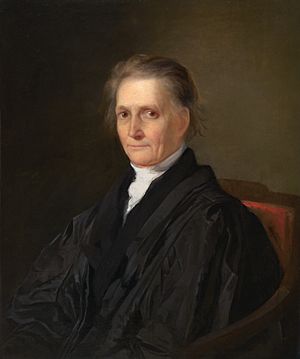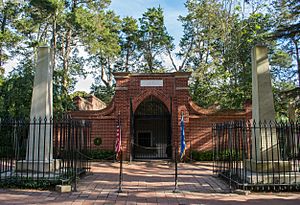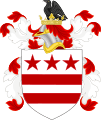Bushrod Washington facts for kids
Quick facts for kids
Bushrod Washington
|
|
|---|---|

Portrait by Chester Harding, 1828
|
|
| Associate Justice of the Supreme Court of the United States | |
| In office November 9, 1798 – November 26, 1829 |
|
| Nominated by | John Adams |
| Preceded by | James Wilson |
| Succeeded by | Henry Baldwin |
| Member of the Virginia House of Delegates from Westmoreland County | |
| In office October 15, 1787 – June 23, 1788 Serving with Richard Lee
|
|
| Preceded by | Daniel McCarty |
| Succeeded by | William A. Washington |
| Personal details | |
| Born | June 5, 1762 Mount Holly, Virginia, British America |
| Died | November 26, 1829 (aged 67) Philadelphia, Pennsylvania, U.S. |
| Political party | Federalist |
| Spouse | Julia Anne (Anna) Blackburn |
| Parents | John Augustine Washington Hannah Bushrod |
| Relatives | Washington family |
| Education | College of William and Mary (BA) |
Bushrod Washington (born June 5, 1762 – died November 26, 1829) was an important American lawyer and politician. He served as an Associate Justice of the Supreme Court of the United States from 1798 until his death in 1829. On the Supreme Court, he was a close friend and ally of Chief Justice John Marshall.
Bushrod Washington was also a co-founder and leader of the American Colonization Society. This group worked to help freed slaves move to Africa. He was the nephew of America's first President, George Washington. After his uncle's wife, Martha Washington, passed away in 1802, Bushrod inherited George Washington's important papers and his famous home, Mount Vernon. With help from John Marshall, he later published a book about the first president.
Contents
Early Life and Learning
Bushrod Washington was born on June 5, 1762, at a place called Bushfield Manor in Mount Holly, Virginia. His father, John Augustine Washington, was George Washington's brother. His mother was Hannah Bushrod. He had a younger brother and two older sisters.
School Days
Bushrod Washington first learned from a private teacher at home. This teacher also taught the children of Richard Henry Lee, who lived nearby. Later, Bushrod went to Williamsburg for more schooling. Even though the American Revolutionary War caused some schools to close, he graduated from the College of William & Mary in 1778 when he was just 16 years old.
In 1780, he returned to study law with a famous teacher named George Wythe. During this time, he met John Marshall, who would later become a very important judge. After serving in the war, Bushrod went to Philadelphia to study law further. His uncle, President George Washington, helped pay for these studies.
Military Service
During the American Revolutionary War, Bushrod Washington joined the Continental Army in 1781. He was a private in a cavalry unit. He fought in the Battle of Green Spring and saw General Cornwallis surrender at Yorktown. His military service ended when the war finished the next year.
Family Life
Bushrod Washington married Julia Anne (Anna) Blackburn. Her father, Colonel Thomas Blackburn, was a planter and had helped General Washington during the war. Bushrod and Julia Anne did not have any children. Sadly, Julia Anne passed away just a few days after her husband, while traveling for his funeral.
Law and Politics
After finishing his law studies in 1784, Bushrod Washington opened his own law office in Westmoreland County. He worked as a private lawyer until 1798. In 1789, he and his wife moved into a new house in Alexandria, Virginia.
In 1787, people in Westmoreland County elected Washington to represent them in the Virginia House of Delegates. The next year, he was elected again and attended the Virginia Ratifying Convention. Here, he voted to approve the U.S. Constitution. He also published books about court decisions, helping to share legal knowledge.
Serving on the Supreme Court
On September 29, 1798, President John Adams chose Bushrod Washington to be an Associate Justice of the Supreme Court of the United States. He officially started his job on November 9, 1798. The United States Senate approved his nomination on December 20, 1798. He served on the Supreme Court until he passed away in 1829.
When John Marshall became the chief justice in 1801, Washington almost always voted the same way as Marshall. This showed they had very similar ideas about the law. During his time on the Supreme Court, Washington wrote important legal opinions. One famous case was Corfield v. Coryell, where he listed several basic rights that he believed all citizens should have.
Mount Vernon and the American Colonization Society
When his aunt Martha Washington died in 1802, Bushrod Washington inherited Mount Vernon, his uncle George Washington's famous home. He also received all of George Washington's personal papers. George Washington's will had stated that his enslaved people should be freed after his wife Martha died. Martha had actually freed them before her death.
When Bushrod Washington and his wife moved to Mount Vernon in 1802, he brought his own enslaved people with him. Running Mount Vernon and supporting the elderly freed people, as his uncle's will required, was very expensive. Bushrod Washington found it hard to maintain the large estate with his Supreme Court salary and the money from the property. To help pay for the upkeep of Mount Vernon, he made the difficult decision to sell some enslaved people.
Bushrod Washington also helped start the American Colonization Society in 1816. He became its national president and remained so until his death. This society aimed to help free African Americans move to Africa, especially to a new country called Liberia. His friend Chief Justice John Marshall also supported this group. Bushrod Washington's role in this society and his efforts to manage Mount Vernon are an important part of his story.
Other Groups and Interests
Bushrod Washington was a member of several important groups. In 1805, he joined the American Philosophical Society in Philadelphia. In 1813, he became a member of the American Antiquarian Society. These groups focused on learning and history.
Death and Lasting Impact
Bushrod Washington passed away in Philadelphia, Pennsylvania, on November 26, 1829. His wife died just two days later while bringing his body back home for burial. Both are buried in the Washington family tomb at Mount Vernon. An obelisk (a tall, thin monument) stands in front of the tomb to remember them. Bushrod Washington was the last Supreme Court Justice who had served in the 1700s.
Because of his work with the American Colonization Society and his help in creating the country of Liberia, an island near Liberia's capital, Monrovia, was named Bushrod Island in his honor.
Images for kids
See also
 In Spanish: Bushrod Washington para niños
In Spanish: Bushrod Washington para niños
 | Precious Adams |
 | Lauren Anderson |
 | Janet Collins |



